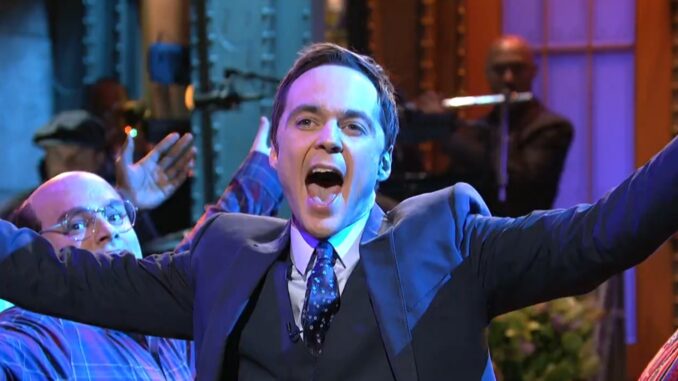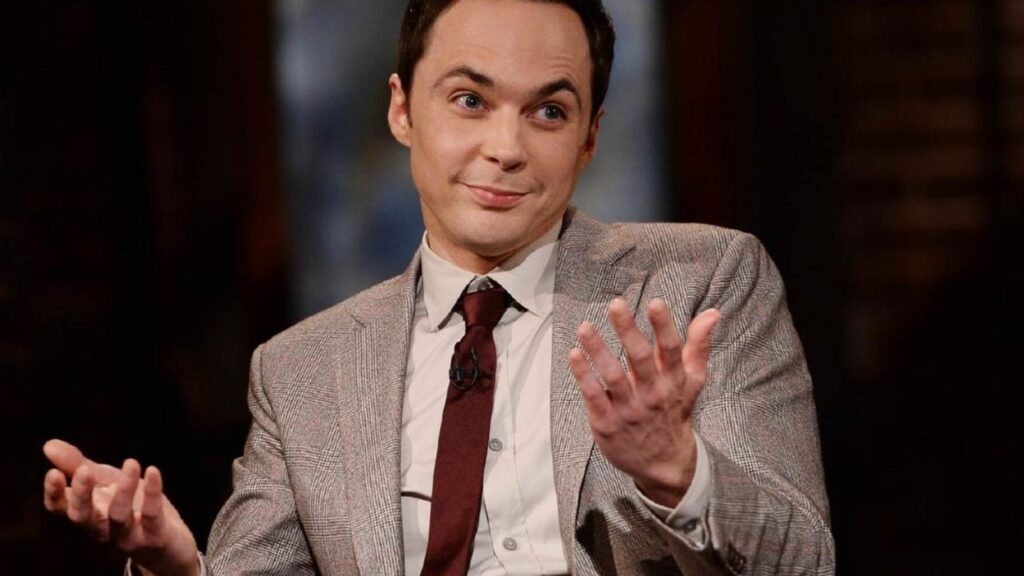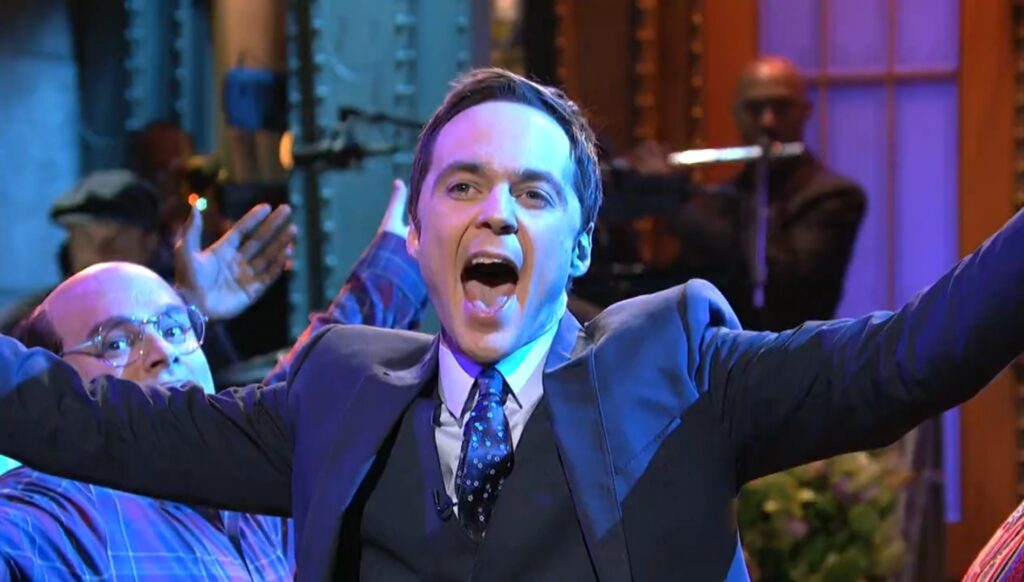
“When I think of rebooting [Big Bang Theory] at the age of 70, that does make me shake a little bit.”
Fresh off his Tony nomination for Mother Play, Jim Parsons is back on Broadway in Our Town. So, does he not like taking a break? “Until [Big Bang Theory] wrapped in 2019, I did not really know what it was to take a break that was not only extended, but also uncertain.” The reason for back-to-back shows—besides theater being “more alive for me now as it…ever has been”—is that “within days of agreeing to one, another came,” and, “I felt very strongly that I wanted to do both.” Parsons plays the stage manager in Our Town, guiding the audience through “one of the better-known plays in the entire canon of theater, and with a cast of 28.” “I said it to Kenny [Leon], the director, in rehearsal the other day, ‘This is the first time in a long time that I’ve worked on something and I thought I could see not really getting tired of [it].'” Parsons knows many will always see Big Bang Theory’s Sheldon in his performances, and he’s fine with that, because the sitcom “undoubtedly offered me more opportunities as an actor and as a human than without it, there’s just no doubt about it.”
You’re going straight from a Tony-nominated performance in Mother Play to Our Town. Do you not like relaxing? Taking time off?
No, I do enjoy relaxing. It’s very funny, because when I did the TV show over 12 years, I sprinkled in a lot of work on the summers, and so the overlap was kind of crazy. It was always enjoyable, because the things I would do, whether it was a lot of theater, a couple of films, or whatever, the things I would do were so different than the TV show that you didn’t feel you were using the same muscles the entire 12 months of the year. But until our show wrapped in 2019, I did not really know what it was to take a break that was not only extended, but also uncertain. Like even if I had a break from our show, if I just took a summer off, I knew that I had three months off, and I knew I was going back into [the show], I knew the character, I knew the people I was going to play with, or whatever. Since then, and especially around with COVID, I’ve really gotten the experience of what it is to have time off that floats in kind of purgatory. I’ve enjoyed it so far. But the reason that these are so close together is because they came within weeks of each other. I had to get a lot of people to very kindly play ball with rescheduling and moving things so that I could do both, because within days of agreeing to one another came and they were suddenly in a weird conflict. But I felt very strongly that I wanted to do both. Because of that, I’ve had about seven weeks off between Mother Play and Our Town.
The experiences are so different. I mean, first off, Mother Play was a new play. And also it was only three people. So to jump to Our Town, which is one of the better known plays in the entire canon of theater, and with a cast of 28, it’s such a vastly different experience. The only thing in common is the most wonderful thing, which is time spent in a rehearsal room, to get to be with everybody and explore something, it’s heaven. It’s become more important to me the older I’ve gotten. Like, I’ve realized that’s more important to me than performance. Everyone’s like, “Would you quit saying that? You’re gonna jinx it…we’d like to open.”
When I was younger, I really feel everything was geared toward the performance, which makes logical sense at some level. I guess it’s just changed for me, or I realized that the good stuff we were mining was happening in the rehearsal room. There’s still discovery, obviously, especially in live theater, performing in front of people, new people, every night, but it’s those weeks spent talking to your fellow actors and the director and the designers. But I think a combination of COVID and our technological social media age has laid bare the blessed fact of being in a room with human beings.
There is this sort of spirit post-COVID on Broadway that does feel more grateful to be there. The energy is different.
It does feel more intensified. It feels more joyful. And I don’t mean like a party, but a celebration of this time together. When I did Mother Play with Celia Keenan-Bolger, she told me there was some study where people in live theater or people in a concert together— there was a time when the heartbeats of the majority of the audience got in sync at some point, or the breathing. It’s like we’re communicating in ways we have no idea. But you do have to be in the same room to access that. Theater is more alive for me now as it either ever has been or that it hasn’t been since I was maybe just young and starting out. I don’t want to call it magic, because it’s not, I really am talking about that communion together, that ritual of the lights going out and the curtain going up.
You mentioned the legacy of Our Town. Does doing a well-known play add more pressure?

Yes, in the way that I undeniably, or parts of me undeniably feel bad and are aware of that. Aas I’ve gotten older, it’s become a little bit easier for me to [know] the reasons I’m doing this, whether they’re for myself or for the world or for the whatever, I can do all of that, whether it’s received as, quote-unquote good or bad, whether it gets rave reviews and Tony nominations, or it gets panned and people are like, “Well, that was the stupidest Our Town I’ve ever seen.” I mean, I don’t want that, and that wouldn’t feel good. But at the same time, there is a level of being able to feel more of a balance about it than I think I would have years ago, which is that this experience is worth being in this room. In this particular case, I do find myself really trying to make these words my own. And the Stage Manager is a character in Our Town that comes on stage and the first thing he says is, “This play is called Our Town…” He gives a cast list. That broken fourth wall is not just a conversation, it’s a conversation between some large essence of who I am. And so it does feel like, in this situation, more than others, I really have to talk as much as Jim Parsons playing the Stage Manager, as ever I’ve been asked to do something like that before. The rewarding part of that is that, with all due respect to every writer I’ve worked with—and they all bring something brilliant to the table—I don’t know that I’ve ever worked with richer, more deeply thought out—and therefore bordering on profound—words in my life. I said it to Kenny, the director, in rehearsal the other day, I was like, “This is the first time in a long time that I’ve worked on something and I thought I could see not really getting tired of this.” It is so enjoyable to swim in it and let it reveal itself. And God knows it sounds different to our ears every time we go through a scene in one way or another, because it’s just dealing with such elemental humanity and what it is to be alive. And what’s going to happen when 1,000 people of new souls are out there every night receiving it? It’s going to be received differently. It’s going to hit their ears differently and then you’ll hear it differently.
You’re also speaking directly to the audience, which feels like something that would be very new for you. You’re rarely ever having to actually connect with the audience in that direct of a way.
I do think it feels new, but I think the reason it feels new is because what I am saying when I’m addressing the public directly through Thornton Wilder’s dialog, again, has been so well constructed. Thornton Wilder had thoughts and feelings and ideas about our lives and what it is to live and to die and what happens to the spirit or the soul, or whatever you want to call it, that it doesn’t offer a protection, but it’s so worth telling to me, it’s so worth getting those words communicated that it does blunt, at least for me, a certain natural fear one might have about, “Okay, look him in the eye.” It makes it more necessary. And the way it’s constructed that you’re an ensemble member, as a fellow actor, I am responsible in that way for not just getting his words and ideas across, but for properly setting up what these other actors are going to come in and do themselves that they have worked on and that they have ideas for. And I don’t know earlier in my life if I would have been joyous and excited about that level of responsibility, if you want to call it that. But I do feel that now. I think it’s because I’m older. It’s just not as scary to me as I think it would have been in the past. It excites me. I finally got into a place, I’m not there all the time, but enough where I know that being responsible to this material and to this cast is no more and no less than being myself and doing what I can do. There will be hiccups, there will be mistakes, there will be things I don’t understand, and all of that is okay. Being responsible is not being perfect, being responsible is not checking off a bunch of boxes, being responsible is allowing yourself to do what you do, which allows everybody else to do what they do.
With the end of Young Sheldon, it really is the end of an era for you. How does it feel for people to see you through that character? Does Sheldon ever haunt you?

It’s an interesting thing, in my life, I don’t think about that character a lot, obviously. I don’t sit around and watch reruns, and I don’t go over old scripts just for fun. [laughs] My relationship to the character is 90 percent less than it was in the 12 years I worked on it. That said, I live in a world where we rerun perpetually, and new people are discovering it all the time, and so I am confronted with it one way or the other many different times in a day or a week. I’ve always known that doing a show like Big Bang Theory in whatever ways it maybe identifies me as something that maybe could cut off some opportunities. It has undoubtedly offered me more opportunities as an actor and as a human than without it, there’s just no doubt about it, but there is something more particular going on right now. Being recognized in a specific way, I do feel somewhat aware of it at the same time. Being able to utilize that too. In some ways, it’s not any different than what I feel I did as an actor to begin with. I always knew in some way who I was and what I brought as a human, as an actor, whatever. And I did the same thing when I auditioned for and got Big Bang Theory, but having myself exposed to so many people from that avenue….
This is really hard to talk about, isn’t it? Not because it’s painful, it’s just hard to find words. I feel like what’s recognizable about me is playing a particular character, like Sheldon. I only got that role because I brought myself at some level, and many times, over and over again, to it that I had done for every role I’d done before and every role I’ll do after that. So there is something recognizable as Sheldon that isn’t Sheldon at all. It’s me, and that can be very useful. I don’t mean monetarily, but as a storyteller.
Speaking of Big Bang Theory, I feel like the topic of a reboot is always talked about with shows as popular as Big Bang was. Do you ever get annoyed being asked about a reboot?
I don’t get annoyed by it. I’m very much never say never about anything, God-willing. Life is very long. So here I am today, at 51 years old, doing a play. When I think of rebooting at the age of 70, that does make me shake a little bit. But no, my instinct is that’s never going to happen and so I think the only thing that bothers me about it is that…oh gosh, I don’t know that anything bothers me about it. It’s that, why don’t I want to do it for two main reasons, the biggest one being, quite selfishly, I did that. I’m sitting here where I am because I really wanted a chance to do other things, too, and God has allowed me to do that. But the other thing is, and this is more to your point, it’s like we had, at our own particular level, whether you liked it or didn’t, we had lightning in a bottle for an amount of time. And I wouldn’t want to touch it again. I mean, you could never go back to it, I don’t think. Never say never. I’ll keep evolving. At this point, I do not see how I could ever go back to it with anywhere near the same inspiration I came to it the first time. I was an utterly different human being. I was at a completely different stage in my career. There were just so many factors that, which is why it’s lightning in a bottle. I remember filming the first season when we didn’t know what was going to happen, and I remember people being like, “Do you think it’s going to make it?” And I was like, “I have no idea.” I knew that what we’re doing is special at some level because you can feel it when it’s happening. Does that translate to a long show? I had no idea, but I think of that now when you ask that question. It’s just hard for me to see how that would ever…you’ve already had that, what’s the point? Wouldn’t you just keep looking for where else you could feel that? Kind of fall in love again?